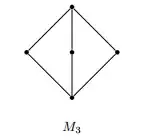The property you are asking about is called the distributive law for lattices.
It's true that the lattice of ideals of a ring is modular, but it need not be distributive. Here is an easy counterexample, shown to me by Ralph Freese:
Let
$$R = \left\{ \left(\begin{array}{cc} x & y\\ 0 & z \end{array} \right)
: x, y, z \in \{0, 1\} \right\}$$
This forms a ring with the usual matrix addition and multiplication.
Let $T$ be the ideal generated by $\left(\begin{array}{cc} 0 & 1\\ 0 & 0 \end{array} \right)$ in $R$. That is,
$$T = \left\{\left(\begin{array}{cc} 0 & 0\\ 0 & 0 \end{array} \right), \left(\begin{array}{cc} 0 & 1\\ 0 & 0 \end{array} \right)\right\}.$$
Now consider the direct product $R\times R$. This is a ring with ideals $0\times T$, $T \times 0$, and $T\times T$ (among others). But there is also the "diagonal" ideal below $T\times T$, which is generated by $\left(\begin{array}{cc} 0 & 1\\ 0 & 0 \end{array} \right) \times \left(\begin{array}{cc} 0 & 1\\ 0 & 0 \end{array} \right)$.
So, the interval below $T\times T$ in the lattice of ideals of $R\times R$ is the modular (nondistributive) lattice which we call $M_3$.

In your notation, you can take $I=T\times 0$, $J = 0\times T$, and $K$ equal to the diagonal ideal, and you will find that the distributive law fails:
$$(I+J)\cap(I+K) = T\times T \neq T\times 0 = I+(J\cap K).$$
